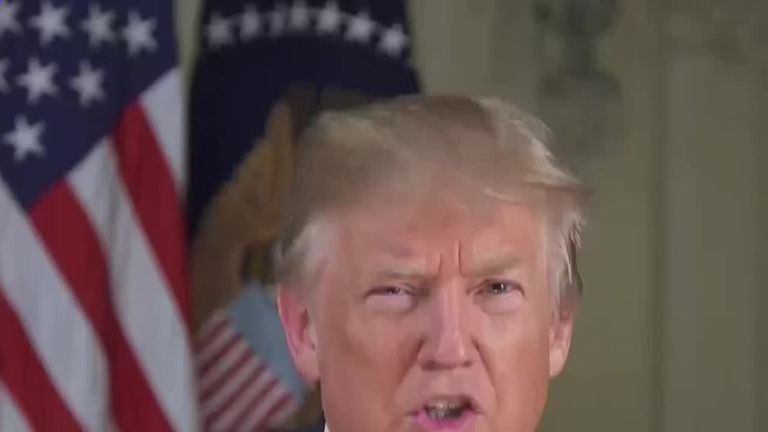What is Nakba Day?

Tuesday 15 May 2018 21:44, UK
By Sanya Burgess, News Reporter
Meaning "Day of the Catastrophe", Nakba Day is when Palestinians commemorate the dispossession of their people.
It marks the displacement of Palestinians that occurred around the Israeli Declaration of Independence and the 1948 war.
How was it marked?
Small scale commemorations were held until the early 1990s when they took on a more prominent role in public Palestinian life - ultimately leading to it being officially inaugurated by Palestinian leader Yasser Arafat in 1998.
It is often marked through protest, strikes and visiting the graves of those killed in the conflict.
What was the 1948 war?
Although the timing of Nakba Day is related to the 1948 war, the roots of the conflict go back to the 18th century.
In 1799, French emperor Napoleon Bonaparte attempted to invade Palestine. Seeking allies, he offered Palestine as a homeland for Jews under the protection of the French.
Although he was defeated, the concept of allocating a Jewish homeland in the region was picked up by the British.
In 1917, the British government issued a public statement known as the Balfour Declaration announcing support for the establishment of a "home for the Jewish people" in Palestine.
At the time, the Jewish population in the region was around 4%.
By 1936, Palestinians fought back against mass Jewish immigration. The British response saw almost 200 Palestinians die and more than 800 wounded before the Palestinians were persuaded to stand down.
The following year, a British inquiry looking into the causes of unrest in the region recommended that Palestine be split. One third was to be given to the Jewish state, the remainder left to the Arab Palestinians. A corridor from Jerusalem to Jaffa would remain under British authority.
A bloody backlash resulted and the matter was taken to the UN, which divided Palestine into an Arab and a Jewish state, with Jerusalem as an internationalised, or shared, city.
Britain announced it would end its mandate in Palestine on 14 May 1948, a date now known as Israeli Independence Day.
Jewish paramilitary forces swept in and on 15 May, the 10 months of fighting that would become known as the 1948 Arab-Israeli war began.
More than 700,000 Palestinian Arabs were forced to flee their homes, ending up in refugee camps in Gaza, Jordan, Syria and Lebanon.
This displacement is known to Palestinians as an-Nakba.
What happened next?
Although Nakba Day marks the beginning of the 1948 war, matters were exacerbated by the Six-Day War in 1967.
This clash was the result of the festering territorial conflict that had not been resolved following the events of 1948.
This brief but bloody war, which saw some 20,000 Arab troops die compared to less than 1,000 Israelis, saw the Jewish State claim further land.
Most of the areas claimed by the State of Palestine have been occupied by Israel since 1967.
What is its significance in 2018?
Last year, US President Donald Trump announced he would move America's embassy from Tel Aviv to Jerusalem.
Both Israelis and Palestinians claim Jerusalem as their capital, but Mr Trump's decision symbolises that the US now recognise it as uniquely Israel's capital.
Most embassies are located in Tel Aviv because of the sensitivities around Jerusalem being a shared city. It is also holy to Jews, Muslims and Christians.
The new embassy was opened on 14 May 2018. While dignitaries and politicians enjoyed the inauguration festivities, a few miles away violent clashes broke out between the Israelis and Palestinians.
Gaza, a Palestinian territory, is currently run by its de facto government, Hamas, a group that many Western countries have designated as a terrorist organisation.
To protest the embassy's inauguration and the Israeli Independence Day, Hamas encourage Palestinians to march on the fence that marks a border between the Arabs and the Jewish state.
Israel says protests against the embassy are used as a cover for terror attacks on Israelis.
On 15 May, more clashes erupted as commemorations of Nabka Day were fed into the mix.
It has been expected to be the final day of six weeks of protest against the Jewish state.
When exactly is Nakba Day commemorated?
It is observed on 15 May - the day after Israeli Independence Day (Yom Ha'atzmaut). Some Arabs chose to commemorate it on Israeli Independence Day on 14 May.
Very occasionally, the two days fall on the same date as Nakba Day is in accordance with the Gregorian calendar, while Israeli Independence Day is on the Hebrew calendar.










